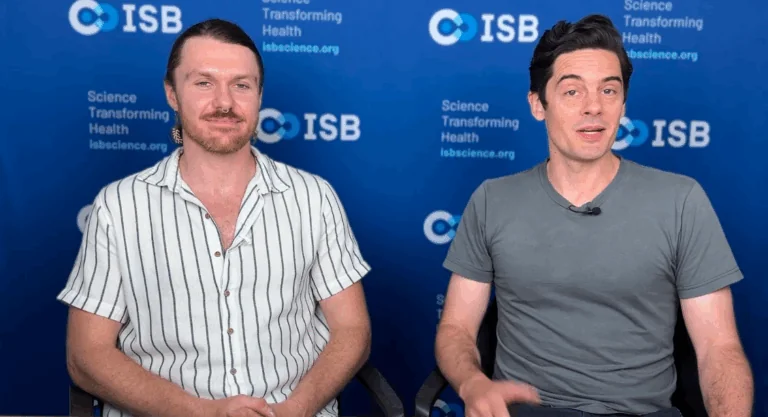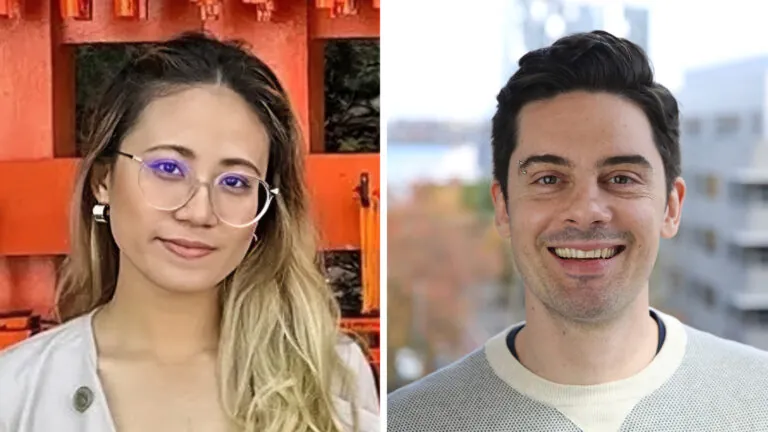Nir Barzilai on Healthspan, Lifespan and the New Science of Longevity
Longevity and aging researcher Dr. Nir Barzilai participated in a fireside chat conversation with ISB Co-founder and Professor Dr. Lee Hood. The two renowned scientists talked about Barzilai’s study of 750 centenarians, how aging research has changed over the years, and what exciting developments are coming.
Longevity and aging researcher Dr. Nir Barzilai, author of “Age Later: Health Span, Life Span and the New Science of Longevity,” participated in a fireside chat conversation with ISB Co-founder and Professor Dr. Lee Hood. The two renowned scientists talked about Barzilai’s study of 750 centenarians, how aging research has changed over the years, and what exciting developments are coming. You can watch their entire conversation by playing the video above, or by going here.
As a 13-year-old boy, Nir Barzilai would walk with his grandfather and listen to his life story. Barzilai remembers his grandfather looking old – bald with a white ring of hair, obese and slow. His grandfather was the same age Barzilai is today, but looked 20 years older.
“It just didn’t make sense,” Barzilai told ISB Co-founder Dr. Lee Hood during a fireside chat conversation. “I always wanted to be a doctor, but I thought, ‘Aren’t you missing the point? You’re talking about cholesterol and hypertension, but there’s something much more dramatic that happens here. And it happens with aging’.”
Today, Dr. Nir Barzilai is a pioneer in longevity and aging research. He founded the Institute for Aging Research at Albert Einstein College of Medicine, and is author of the book “Age Later,” which helps understand “super agers” – people who maintain active lives into their 90s and beyond, and who reach those ages without experiencing cancer, diabetes, cardiovascular disease or cognitive decline.
In the past, Barzilai said people didn’t realize that biology was driving diseases. “It’s not that disease causes us to age. Aging causes the disease. But more importantly, this biology of aging is modifiable. You can target this biology and extend both health span and life span,” he said
“If you don’t accept this message, you have to leave first class and go to coach,” he joked.
Early Research, Exciting Developments
During their hour-long conversation, Barzilai and Hood covered a number of topics.
Barzilai spoke of how he got his start in research, and the difficulty in finding a mentor in a field that didn’t yet exist.
He discussed some of his early experiments. As a “physiologist trying to understand biology,” he was interested in how humans develop obesity. In an experiment, he took rats and aged them. For some, he removed their intra-abdominal fat, and saw an improvement in metabolism and life span. “They lived healthier and longer than the others,” he said.
Barzilai spoke at length about his work with centenarians, who have 20 to 30 more years of health span than the general population. “It’s not just that they live longer – they live healthier,” Barzilai said. While most people start having diseases five to eight years before death, most centenarians get diseases weeks or months before.
And the two researchers talked about drugs like metformin and rapamycin, and the importance of diet and exercise for everyone.
RELATED: David Sinclair on why we age, and why we don’t have to
About the ISB-Town Hall Seattle Science Series
ISB and Town Hall Seattle have put on a number of virtual events focusing on a range of important scientific issues: Why we age (and why we don’t have to), the importance of getting kids outside, STEM policy and advocacy, the politics of immunization, mining sewage to track population health, creating new senses for humans, and more.
We will continue creating compelling events. To make sure you know of upcoming conversations, please follow us on Facebook, Twitter, LinkedIn and Instagram, and be sure to sign up for our newsletter for event updates.


